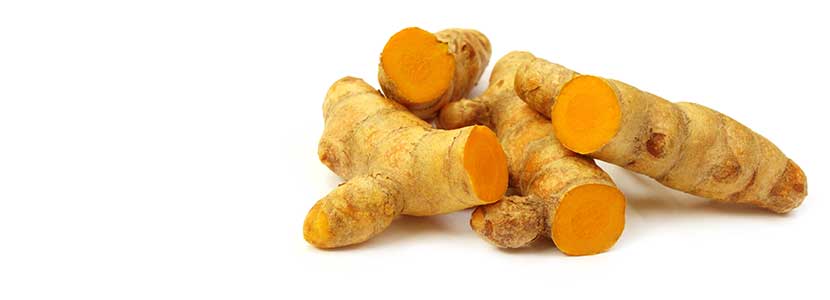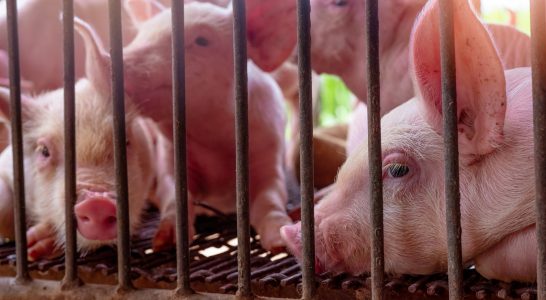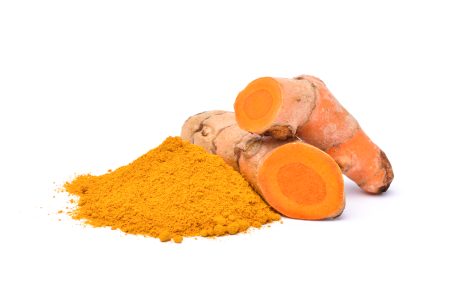STUDY DIETS
 28 Apr 2022
28 Apr 2022
Turmeric supplementation in piglets has shown very promising results that suggest its potential use as a natural growth promoter. It has been reported to be an antimicrobial and anti-inflammatory agent. Studies conducted by Avanco et al. (2017) reported that the α-turmerone, β-turmerone and ar-turmerone components of turmeric possess antifungal, antimycotoxigenic and antioxidant activities.

Turmeric, also known as the golden spice, is a popular medicinal herb derived from the rhizomes of Curcuma longa Linnaeus. It plays a vital role in traditional medicine as an antimicrobial and anti-cancer agent.
Pigs at weaning are supplemented with antibiotics as a prophylactic measure against potential infections or to reduce morbidity and mortality. This indiscriminate use of antibiotics in production animals has given way to multi-drug resistance in both animals and humans.
Turmeric contains approximately:
The main bioactive compounds found within it are curcuminoids.
STUDY DIETS
A total of 48(Duroc × [Yorkshire × Landrace]) weaned piglets were assessed in the following study. The trial lasted 6 weeks and two dietary treatments were used: a control diet composed by corn flour and soy without turmeric and another diet with 1% turmeric powder weight by weight (w/w) .

RESULTS
Results revealed that dietary inclusion of turmeric improved the piglets’ final weight and the total daily gain average. In turn, short-chain fatty acids (acetic, butyric and propionic acids) concentrations found in fecal samples were higher for those piglets consuming the diet with turmeric inclusion. The incidence of diarrhoea amongst piglets was reduced when the diet was supplemented with turmeric.
As for the piglets’ hematological parameters, no variation was evidenced. On the other hand, it was noted that the animals did not manifest stress signs during the duration of the trial.
CONCLUSIONS
Based on these results, it is suggested that the use of turmeric as a potential alternative promoter for piglet growth could be adopted. Diets containing 2%, 4% and 6% turmeric powder improved final live weight and feed conversion rate compared to pigs fed a control diet.

The beneficial effects of turmeric on growth performance could be due to the increased secretion of enzymes like: amylase, trypsin, chymotrypsin and lipase.
Therefore, it has been shown to influence intestinal microbial fermentation and contribute to gut health. Improving the amounts of beneficial bacteria, short chain fatty acids (SCFAs), and exerting a positive effect on gut morphology.
SOURCE: Animal Science and Technology. Dietary turmeric ( Curcuma longa L.) supplementation improves growth performance, short-chain fatty acid production, and modulates bacterial composition of weaned piglets 2021.
Subscribe now to the technical magazine of animal nutrition
AUTHORS

Nutritional Interventions to Improve Fertility in Male Broiler Breeders
Edgar Oviedo
The Use of Organic Acids in Poultry: A Natural Path to Health and Productivity
M. Naeem
Synergistic Benefits of Prebiotics and Probiotics in Poultry, Swine, and Cattle
Gustavo Adolfo Quintana-Ospina
Hybrid Rye Potential in Laying Hen Feed Rations
Gwendolyn Jones
A day in the life of phosphorus in pigs: Part I
Rafael Duran Giménez-Rico
Use of enzymes in diets for ruminants
Braulio de la Calle Campos
Minerals and Hoof Health in the Pregnant Sow
Juan Gabriel Espino
Impact of Oxidized Fats on Swine Reproduction and Offspring
Maria Alejandra Perez Alvarado